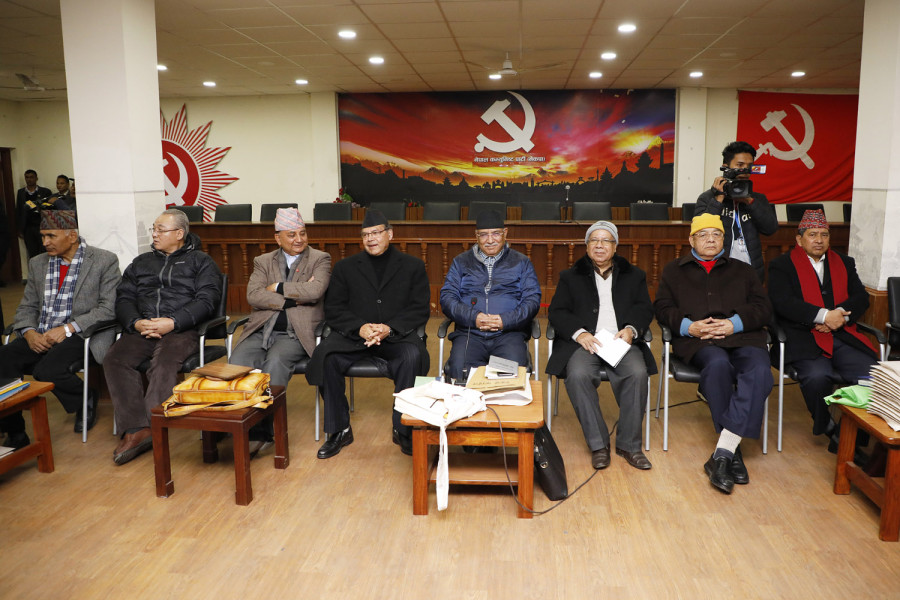Politics
Ruling party members ask leadership to seek clarity on MCC compact from the US
Opposition to the programme could not only delay its ratification but also give rise to diplomatic friction between Nepal and the US, observers say.
Tika R Pradhan
The Millennium Challenge Corporation’s Nepal Compact once again took centre stage at the Nepal Communist Party’s standing committee meeting on Saturday, as members put pressure on the leadership, and the government for that matter, to seek clarity from the United States.
Some ruling party leaders have been expressing reservations about the US programme, arguing that the grant is part of the United States’ larger strategy to counter China, Nepal’s northern neighbour, and Beijing’s Belt and Road Initiative.
After members demanded a definite answer, party Co-chair Pushpa Kamal Dahal told the meeting that the government would ask the United States to clarify if the MCC compact is part of the Indo-Pacific Strategy, according to a leader.
Bhim Rawal, a standing committee member, said that after leaders expressed serious concerns over a number of issues and provisions of the MCC agreement, Dahal told the party members that Nepal will accept the grant only if the US government formally makes it clear that MCC is not part of the Indo-Pacific Strategy.
The Indo-Pacific Strategy has been a subject of speculation among Kathmandu’s political and diplomatic circles ever since Foreign Minister Pradeep Gyawali visited Washington in December last year. Some sections of the ruling party have opposed Nepal’s participation in the strategy, calling it the government’s attempt to ratify the MCC compact through Parliament.
Nepal became eligible for the MCC, announced in 2002 by US President [George W] Bush, in 2011 and signed the agreement in 2017. For its implementation, it needs to be ratified by Nepal’s Parliament. But it did not pass during the previous House session because of, by Prime Minister KP Sharma Oli’s own admission, the reluctance of Krishna Bahadur Mahara, who was the House Speaker until early October.
The early opposition to the MCC was from the former Maoists, but now those from the former CPN-UML also have been objecting to the US programme, which could put the government in a fix, say party insiders.
“Concerned governments must clarify the issues. If not, things will not move ahead,” said Asta Laxmi Shakya, a standing committee member from the Madhav Nepal camp in the ruling party. She said many leaders have asked the party leadership not to take decisions on the MCC in a haste.
US officials though have termed MCC an important initiative under the Washington-led Indo-Pacific Strategy, all of them, including Ambassador Randy Berry, have time and again tried to dispel concerns surrounding the strategy itself, saying it is just a US “policy” and it does not require or demand membership from anyone.
But Communist party leaders continue to see the strategy, and its MCC link, as an attempt to counter China’s Belt and Road Initiative and Beijing’s influence.
“The foreign minister called on the meeting to help endorse MCC through Parliament, saying there are no serious implications,” said Raghuji Panta, a standing committee member. “But leaders demanded clarity saying many points of the agreement are serious in nature as they contradict the constitution and undermine sovereignty.”
While party Spokesperson Naryan Kaji Shrestha told the Post last week that the MCC compact won’t be held hostage to opposition from some leaders, Minister for Communication and Information Technology Gokul Baskota made it clear that the US programme would be ratified by the Parliament’s winter session, which began on Friday.
The MCC, which is a bilateral foreign aid agency of the United States, will provide $500 million in grants to Nepal in support of certain predetermined infrastructure projects once the compact is ratified by Parliament.
“One of the provisions, which is a cause for concern, is that only the US can audit the expenses,” said Rawal. “Nepal has to invest more than 13 billion rupees under the programme, so Nepal should also have the right to audit the expenses.”
According to Rawal, the provision allowing only the US to terminate the agreement is also faulty. “It should include a provision allowing Nepal also to terminate the agreement. It is against the spirit of equality between sovereign countries,” said Rawal. “The provision that calls for India’s consent for the implementation of the programme also undermines Nepal’s sovereign decision making.”
If the party asks the government, as told by Dahal at Saturday’s meeting, to seek clarity from the US on the MCC compact and the Indo-Pacific Strategy, according to analysts, it could result in soured relations between Kathmandu and Washington.
Geja Sharma Wagle, a political and security analyst, said the debate over the MCC, with opposition from leaders from the former UML, shows the ruling party has made its opposition to the programme official.
“The MCC compact was signed by the Congress government of which the former Maoist party was a coalition partner,” said Wagle.
Wagle described the ongoing debate over the MCC, which was never called into question since it was signed as there was no need for it, is nothing but “the best example of [ruling party’s] myopic diplomacy.”
“It can have serious implications when it comes to diplomatic relations,” Wagle told the Post.
Dahal’s statements in the past had caused some unease for the ruling party—and the government—when he criticised what he called US intervention in Venezuela in January and disapproved of the Indo-Pacific Strategy in September.
Foreign Minister Gyawali, however, ruled out any diplomatic friction between Nepal and the US due to the ongoing debate on the US programme and the growing demand from the party members to seek clarity from Washington.
“It’s just about making things transparent when it comes to the MCC and its link with the Indo-Pacific Strategy,” Gyawali told the Post.




 16.12°C Kathmandu
16.12°C Kathmandu















